This article was medically reviewed by Luba Lee, FNP-BC, MS and by wikiHow staff writer, Jessica Gibson. Luba Lee, FNP-BC is a Board-Certified Family Nurse Practitioner (FNP) and educator in Tennessee with over a decade of clinical experience. Luba has certifications in Pediatric Advanced Life Support (PALS), Emergency Medicine, Advanced Cardiac Life Support (ACLS), Team Building, and Critical Care Nursing. She received her Master of Science in Nursing (MSN) from the University of Tennessee in 2006.
There are 9 references cited in this article, which can be found at the bottom of the page.
This article has been viewed 23,662 times.
Ear infections are common in children, but ear infections in adults are just as painful. To prevent ear infections, maintain a strong immune system, address any underlying allergies, prevent swimmer’s ear, and practice good hygiene so your body can fight off bacteria and viruses. Remove dirt and grime from around your ears, but avoid sticking things into your ears which could introduce germs. In addition to keeping your ears dry, wash your hands frequently and avoid smoking, which can inflame the tissue in your ears.
Steps
Keeping Your Ears Clean and Dry
-
1Wipe the outside of your ears with a warm washcloth about once a week. Your inner ears don't need any special cleaning, but it's a good idea to keep the skin of your outer ears free from dirt and grime. Take a warm washcloth and get it a little soapy. Wipe behind your ears and clean the folds near the top of your outer ears.[1]
- The dead skin from your inner ears will actually fall off and out of your ears. This usually happens while you're laying in bed.
-
2Dry your ears after they get wet. Bacteria that cause ear infections thrive in moist environments, so it's important to keep your ears dry. To dry your ears after swimming or showering, take a clean cloth and wipe your outer ears. Tilt your head so water in your ear drains out.[2]
- Avoid sticking the cloth into your ear canal since this can push softened earwax further into your ear canal.
Tip: If you'd rather use a hair dryer, turn the dryer to the lowest setting and position it at least 1 foot (30 cm) away from your ear. Keep the dryer pointed at your ear for about 30 seconds before drying the other ear.
Advertisement -
3Prevent chemicals from getting into your ears. Chemical irritants from beauty products can work their way into your ears and cause inflammation. To protect your ears when you apply hairspray, hair dyes, or products that could get into your ears, place cotton balls into the crook of your outer ear. Remove the cotton once you're done with your beauty regimen.[3]
- Ensure that you don't push the cotton balls into your ear canal where they can cause irritation.
-
4Talk to your doctor about ways to soften and reduce earwax. If you frequently have issues with earwax buildup, talk to your doctor. They may clean your ears out with warm water and a bulb syringe, or recommend over-the-counter treatments, such as a wax removal kit or drops.[4]
- Be careful not to overuse wax removal treatments as they can irritate the inside of your ear canal.
-
5Avoid using cotton swabs to remove earwax. If you insert cotton swabs, paper clips, or hairpins into your ear to dig out earwax, you could scratch the ear canal. This will irritate your ear and could actually pack the earwax deeper into your ear.[5]
- You might accidentally puncture your eardrum if you insert an object into your ear. Puncturing the eardrum can cause infection and hearing loss.
Making Lifestyle Changes
-
1Quit smoking and avoid secondhand smoke. Since smoking can cause upper respiratory and ear infections, cutting out smoking will reduce your risk for ear infections. Quitting will also improve your immune system and reduce inflammation.[6]
- To avoid secondhand smoke, stay away from public places where smoking is allowed. Tell people who spend a lot of time around you to stop smoking around you.
-
2Treat your allergies to reduce inflammation. If you have allergies, such as seasonal or pet dander allergies, work with your doctor to find medications that can help you manage the symptoms. It's also important to avoid things that trigger your allergies.[7]
- Keeping your allergies under control will reduce inflammation and mucus that can cause ear infections.
-
3Maintain a healthy immune system with hand-washing, diet, and sleep. To keep your immune system strong enough to fight off germs that cause ear infections, wash your hands throughout the day. Also, make sure that you eat healthy foods and avoid unhealthy foods. Get at least 8 hours of sleep every night as well.[8]
- Try to avoid being around people who are sick with the common cold or who have upper respiratory illnesses.
- Even though you're washing your hands often, don't stick your fingers in or around your ears.
-
4Apply drops to your ears before swimming to prevent swimmer’s ear. Purchase or make an eardrop solution that you can put into your ears before you go swimming. Pour 1 teaspoon (4.9 ml) of the solution into each ear and then tilt your head so the solution drains out. The solution will help your ears dry faster once you get out of the water and it will prevent germs from thriving in your ear.[9]
- You should not use the eardrop solution if you have a punctured eardrum.
- If you don't like using drops, put earplugs in your ears before you go swimming.
Homemade Ear Drop Solution: Combine 1⁄2 cup (120 ml) of white vinegar with 1⁄2 cup (120 ml) of rubbing alcohol in a clean bottle. Store the solution for up to 1 year.[10]
-
5Stay updated on your vaccines to keep your immune system strong. Specifically, ask your doctor if you've gotten the pneumococcal conjugate vaccine since this vaccine protects against bacteria that can cause ear infections.[11]
- Staying healthy is an important part of preventing ear infections because a weakened immune system is less able to fight off infection.
References
- ↑ https://my.clevelandclinic.org/health/diseases/8613-ear-infection-otitis-media
- ↑ https://www.cdc.gov/healthywater/swimming/swimmers/rwi/ear-infections.html
- ↑ https://www.betterhealth.vic.gov.au/health/conditionsandtreatments/swimmers-ear
- ↑ https://my.clevelandclinic.org/health/diseases/14428-ear-wax-buildup--blockage
- ↑ https://www.health.harvard.edu/staying-healthy/got-an-ear-full-heres-some-advice-for-ear-wax-removal
- ↑ https://www.cdc.gov/antibiotic-use/ear-infection.html
- ↑ https://www.keckmedicine.org/how-to-prevent-ear-infections-when-its-cold/
- ↑ https://my.clevelandclinic.org/health/diseases/8613-ear-infection-otitis-media
- ↑ https://www.cdc.gov/healthywater/swimming/swimmers/rwi/ear-infections.html
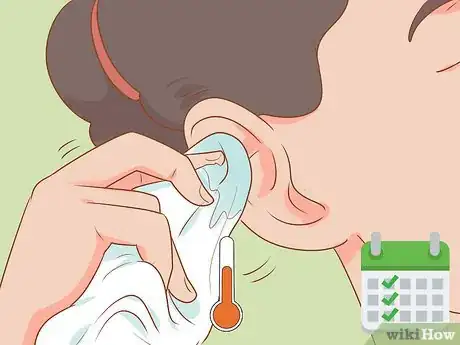
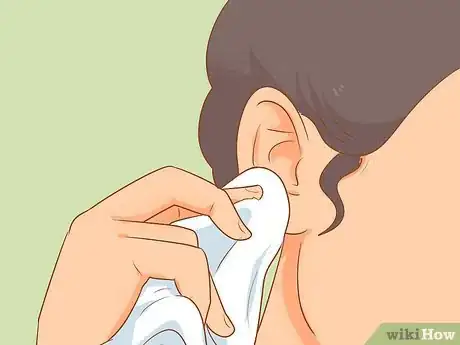






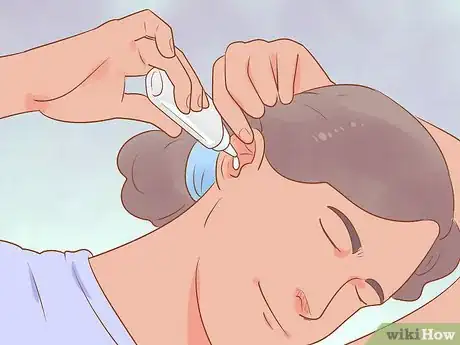
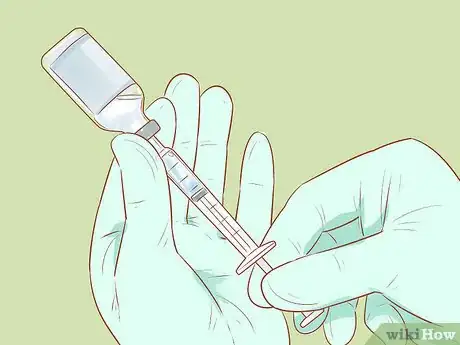


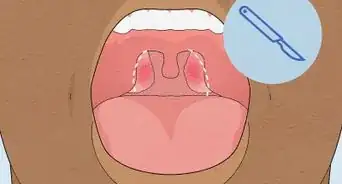




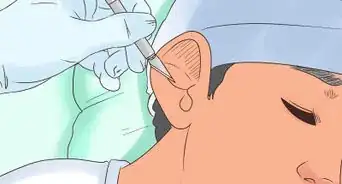













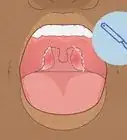




































Medical Disclaimer
The content of this article is not intended to be a substitute for professional medical advice, examination, diagnosis, or treatment. You should always contact your doctor or other qualified healthcare professional before starting, changing, or stopping any kind of health treatment.
Read More...